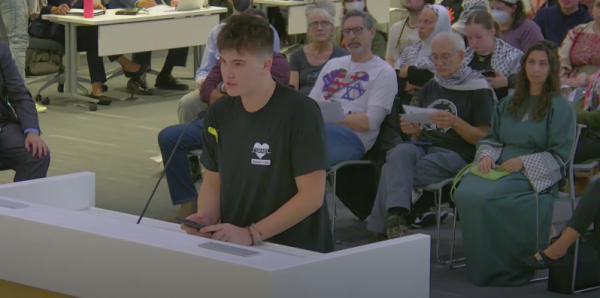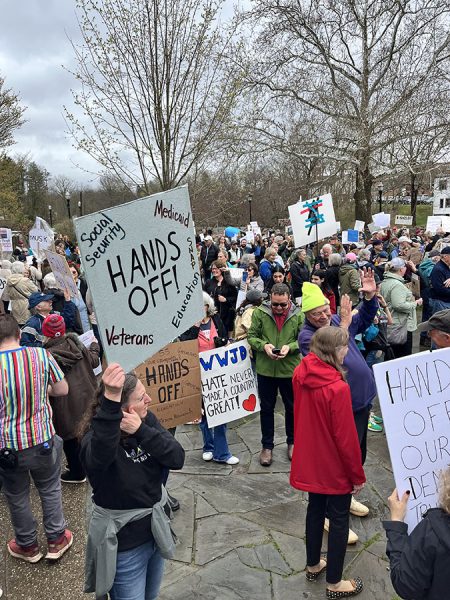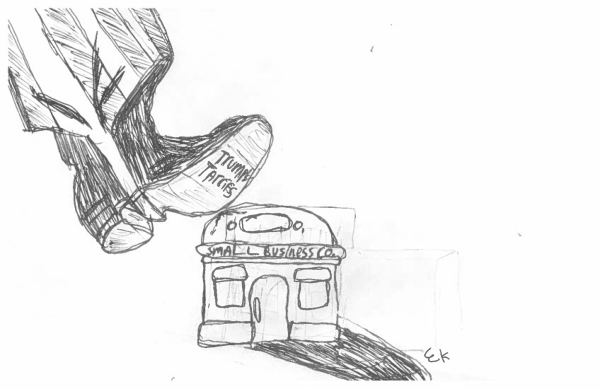The Semantics of Police Violence
Which words are best suited for the discourse surrounding accountability in our criminal justice system?
In his 1946 essay “Politics and the English Language”, George Orwell makes two key observations–the rhetorical choices we make in writing are inherently political, and our political climate is driven by the way people choose to manipulate the English language.
Never has this analysis seemed more apt than in the year 2020, with the momentum of the racial justice movement crashing full-force into a flawed, ubiquitous criminal justice system. We are all constantly barraged with information, and in the past few months, much of that has been about the death of African American people at the hands of police.
And yet, the subtlest rhetorical choices in the way we report this information can instill vastly different political perspectives, precipitating devastating consequences when rhetoric becomes policy.
It falls upon us to consider how the subtle phrasing in the media we consume shapes analogy and messaging–and to find the optimal way of relaying this sort of information. Let us start with arguably the most deceptive rhetorical option, below.
On [M/D/YYYY], [Name] was shot by police in [City], [State].
This statement is objectively true, and yet under the hood, it is not without political and emotional subjective messaging.
Of crucial importance to our analysis is the verb “shot”–it almost feels like a euphemism. While it is directly implied that the police killed a person in the interaction, all it says is that the police shot their weapons at the person; the fact that they died is simply the consequence of a gun being shot.
In short, the use of the word “shot” shifts the blame away from the shooters. More importantly, it detracts from the very real consequences of the event–grieving family members, heartbreak and shattered futures are not the focus, a moment of instantaneous violence is.
While not absolving the police of any wrongdoing, the choice to use the word “shot” seems chosen to paint the police in as good a light as possible, and distract the reader from the consequences of the “shooting”. It follows that we must swap out “shot” for something less vapid.
On [M/D/YYYY], [Name] was killed by police in [City], [State].
This is a large improvement over the previous wording. By saying that the police “killed” the person in question, this sentence emphasizes death as the intended consequence of the police’s actions.
And yet, it does not accurately convey the reality of the situation. In crudest terms, killing is part of the job. Police kill people often (at least 826 people in the past year were killed by police), often even for (arguably) valid reasons.
This can be adjusted for by adding more words to the sentence–describing the victim as “innocent” or “non-violent”, stating that the person was “wrongfully” killed by police, etc.
But this sort of rhetorical nuance can be disadvantageous to the reporting of facts, because it opens the door for debate. Bigots and complacent actors, from there, will inevitably argue that the person in question is not truly innocent (citing arrest records, for instance) or that there is nothing truly “wrongful” about the killing (citing the alleged fear of the killer).
Frankly, the subjective innocence of the victim or assumed fear of the killer is not relevant to relating the objective truth of the situation–when an abuse of power occurs, it is an abuse of power, regardless of the feelings or character of either party. Let us try an even stronger verb in place of “killed”.
On [M/D/YYYY], [Name] was murdered by police in [City], [State].
This is a favorite of activists and arguably an improvement over “killed”, but it is problematic as well. Critically, this alternative emphasizes the humanity of the victim. The verb “killed” is not specific to humans (animals, lights, car ignitions, can be “killed”), but “murdered” is.
Furthermore, this construction attributes a plain moral and legal judgement on the police–they are murderers. However, murder is often premeditated, and almost always driven by a personal hatred between murderer and victim.
Police killings of this nature are usually impersonal, driven not by a personal antagonism but by subconscious bias, outdated policing practices and legislation (from redlining to the war on drugs) that has been purposefully implemented to devastate Black communities.
While “murdered” successfully passes judgement on the killers, it perpetuates the toxic notion that this sort of killing is an outlier in a sea of otherwise fair and valid interactions between police and African-Americans.
The choice of “murdered”, while condemning the killers, absolves a corrupt system of systemic wrongdoing. Let’s move on to a final (arguably optimal) example.
On [M/D/YYYY], [Name] was extrajudicially executed by police in [City], [State].
This choice is not used very often, and it may seem odd or inappropriate at first. And yet, it resolves most of the problems with “murdered”.
Extrajudicial executions are usually brought up when discussing oppressive government regimes–we use “extrajudicial execution” when we talk about the Soviet “Great Terror”, the civil wars of 20th century Latin America, and political purges like the Nazis’ Night of the Long Knives.
Extrajudicial executions are not legitimate acts of government, but they are nonetheless official acts of government. When an extrajudicial execution occurs, it is not a momentary lapse in judgement committed by an individual, or the consequence of some unfortunate coincidence, it is part of a pattern, one of many such executions, carried out towards an end.
This “end” doesn’t have to be concrete or transparent. While the Night of the Long Knives did have a concrete, transparent goal (purging Ernst Röhm and his allies from the Nazi Party), extrajudicial executions don’t always follow this rule.
The Soviet Purges, for instance, were born of political paranoia, outdated perceptions of the value of human life and overall institutional flaccidity. Nonetheless, the Soviet Purges were a critical part of the state apparatus, and the existing party system operated because of these purges, not in spite of them.
The extrajudicial executions of Black people by our police are nothing new, nor are they all that rare–violence against Black communities is an arm of our justice system, and while these executions are not condoned by the state, they are expected.
I do not expect “extrajudicially executed by police” to catch on anytime soon. It takes up a lot of space, and probably doesn’t get as many clicks on web aggregators as “killed” or “shot”.
But all I can hope is that this exercise has, to some infinitesimal degree, increased our collective conscience of how rhetoric can frame our perception of events, and, in turn, affect concrete policy changes. This sort of fundamental insight into rhetoric is the sort of thing we have to learn now, in high school, and be adept at by the time we reach college, lest we, legal adults and voting citizens, be deceived.
BHS has a staggering track record for drilling information into students’ heads and procuring satisfactory AP scores, but this is a different task than educating critical media consumers. It falls upon us to learn the nuance of rhetoric and consider its ramifications. The potential to be confused or misled by others’ rhetoric is substantial, and the stakes, as we’ve seen this summer, are immeasurable.

Alice Soprunova (she/her) began writing for the Beachcomber in 2019. She covers stories pertaining to issues of social justice inside and outside BHS....













